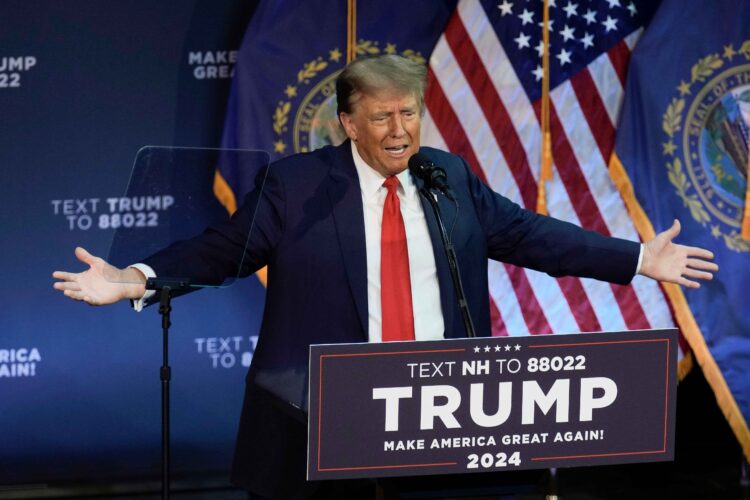Former President Donald Trump has won the New Hampshire Republican primary election, receiving 54.3 percent of the vote. South Carolina Governor Nikki Haley came in second, receiving 44.3 percent.
These percentages have been updated as of Wednesday at 5:04 p.m., when more than 95 percent of the vote had been counted. At the time this article was first published, only 18 percent of the vote had been counted. The Associated Press (AP) called it for Trump at 8:04 p.m. The New York Times called it at 8:09 p.m.
Ron DeSantis, who dropped out on Sunday, received 0.7 percent. Trump picked up 12 delegates and Haley picked up 9.
Earlier on Tuesday, Haley vowed to remain in the race even if Trump won New Hampshire, so we can expect her not to drop out—especially not before the Republican primary in her home state on February 24th. She confirmed this on election night: “New Hampshire is first in the nation, it is not last in the nation. This race is far from over,” she told a crowd of supporters.
Most polling sites were open between 6 a.m. and 8 a.m. Most closed at 7 p.m., but some were open until 8 p.m. President Joe Biden was not on the ballot due to new Democratic National Committee (DNC) rules that made it so that the Democratic South Carolina primary (on February 3rd) is its first sanctioned contest of 2024. Local supporters of Biden, however, had started a late effort to vote for the incumbent via write-ins, which some predicted would slow down the vote count—but the New Hampshire Secretary of State assured reporters there was not going to be a problem. Biden, of course, won tonight’s New Hampshire Democratic primary.
New Hampshire is an open primary, meaning people of any party affiliation were allowed to vote in the election. Trump-aligned candidates have reportedly struggled in New Hampshire in recent elections. In the 2020 general election, 46 percent of New Hampshire’s voters identified as independents, 31 percent as Republicans, and 23 percent as Democrats. Biden took 62 percent of the independent vote.
Exit polling from CNN found that 70 percent of Haley voters were not registered Republicans. Conversely, registered Republicans accounted for 70 percent of Trump voters.
Democrats are voting for Nikki Haley tonight in the New Hampshire primary. They’re Biden supporters pic.twitter.com/DDRDihlabF
— Nuance Bro (@NuanceBro) January 24, 2024
Voters in the New Hampshire city of Dixville Notch were permitted to vote just after midnight on Tuesday morning, and they overwhelmingly voted for Haley. This led media outlets to report that Haley “swept” the vote, despite the fact that a total of six people voted.
Learn the benefits of becoming a Valuetainment Member and subscribe today!
On the morning of Monday, January 22nd, the New Hampshire attorney general’s office said it was launching an investigation into a fake robocall that allegedly told Democratic voters not to vote in the primary. The “unlawful attempt” to “suppress” the vote featured a voice impersonating Joe Biden telling people to stay home and not waste their vote.
The GOP primary is technically a three-person race, as Texas pastor Ryan Binkley held on after receiving 0.7 percent in the Iowa caucuses. Binkley believes God has spoken to him regarding political issues. Binkley, a co-founder of a financial services company, has spent over $8 million of his own money on his presidential effort. However, Binkley has not participated in a single debate and no one really knows who he is—even his campaign signs reflect this, reading: “Who Is Ryan Binkley?”
Florida Governor Ron DeSantis and Vivek Ramaswamy both dropped out over the last several days after receiving 21.2 percent and 7.7 percent respectively in Iowa. Both endorsed Trump.
Asa Hutchinson also dropped out, but did not endorse Trump—he indirectly threw his support behind Haley. Chris Christie also dropped and did not endorse Trump.
There will be thirty-seven more state and territory primaries, ending with Louisiana on March 23rd. Just 11 will be closed primaries, and 22 will be open or semi-open (Republicans and independents). Most of the Republican contests’ delegates will be awarded in March: by the end of Super Tuesday (March 5th), 1,205 out of the total 2,429 will have been assigned to candidates. By the end of March, that number will go up to 1,772. A candidate needs 1,215 delegates to win the primary election and receive the Republican nomination.
 Shane Devine is a writer covering politics, economics, and culture for Valuetainment. Follow Shane on X (Twitter).
Shane Devine is a writer covering politics, economics, and culture for Valuetainment. Follow Shane on X (Twitter).


















Add comment